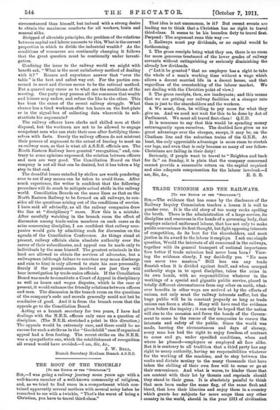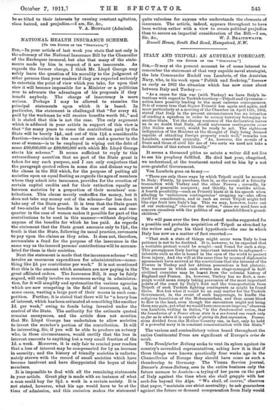TRADE UNIONISM AND THE RAILWAYS.
[To THE EDITOR 011. TEM "SPECTATOR."] SIR,—The evidence that has come by the disclosure of the Railway Inquiry Commission teaches a lesson it is well to ponder over. It is the old story of too many cooks spoiling the broth. There is the administration of a large service, its discipline and resources in the hands of a governing body, that employs salaried uniformed labour, that has not only to make public convenience its first thought, but fight opposing interests of competition, do its best for the shareholders, and meet justice in its award to the labour it employs. I ask one simple question, Would the interests of all concerned in the railways, together with its general transport of national importance fare better if trade unionism had never been born ? View- ing the evidence closely, I say decidedly yes. "No man can serve two masters." Still less can any trade flourish when it is divided against itself, and when usurped authority steps in to upset discipline, takes the reins in its own hands, with no responsibilities whatever in the workings of a special and gigantic public service, placed in totally different circumstances from any other on earth, what- ever benefits in other ways are arrived at by the efforts of unions, not only must the railway interests suffer, but the huge public will be in constant jeopardy so long as trade unions can force a strike. Many will have read the evidence given before the inquiry ; it can only be hoped that the nation will rise to the occasion and force the hands of the Govern- ment to come to the rescue of the companies to ensure the interests and safety of the public. Since the world was made, barring the circumstances and days of slavery, every man has had the right to enjoy freedom of contract to come and go, under specified conditions, when and where he pleased—employers or employed all fare alike. But it is contrary to all tradition that a third party has any right to usurp authority, having no responsibilities whatever for the working of the machine, and to step between the ranks and dictate mutiny to the many thousands that have taken the shilling of their own free will to come or go at their convenience. And what is worse, to hinder those that are content with their lot by threats and reprisals should they stand to their guns. It is absolutely painful to think that men born under the same flag, of the same flesh and blood, that love their liberties and enjoy them in a country which grants her subjects far more scope than any other country in the world, should in the year 1911 of civilization
be so blind to their interests by causing constant agitation, class hatred, and prejudice.—I am, Sir, do., V. A. MONTAGU (Admiral).































































 Previous page
Previous page